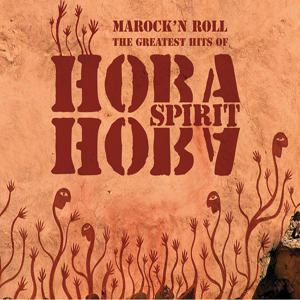Hoba Hoba Spirit, out of Casablanca, moved from underground secret to trend-setting national band in Morocco after an electrifying performance at the Boulevard des Jeunes Musiciens festival in 2003. It was instantly clear that this band fit no existing mold in Moroccan music. They played a blend of punky, metal-tinged rock, reggae and rap, with Moroccan rhythms interwoven. They sang and rapped rough, and laid out the concerns of young Moroccans (60% of whom are under 25) in plain terms. The band was tight, the songs catchy, and the moment right for a new sound. After being rejected by industry gatekeepers, Hoba Hoba Spirit had resorted to putting their music online; they count the internet as one of the things that allowed them to keep going. Morocco’s remarkable variety of live music festivals filled in the other crucial element, for once young audiences got a taste of Hoba Hoba’s bracing, joyful live energy, there was no stopping them. At the 2011 Mawazine Festival in Rabat, they were greeted by tens of thousands of kids—mostly boys—who knew the lyrics (in Arabic, French and English), and went nuts during the band’s entire 90-minute set.
Ironically, at a time when Hoba Hoba has long since given up on selling CDs in Morocco—economic realities and piracy make this a fool’s errand—the band has an international CD, and for those of us still willing to actually pay for music, it’s a great introduction. Even if you understand few of the words in these 18 succinct, energized tracks, you can’t miss this band’s fresh energy and exuberant attitude. There are four vocalists, and so we get a range of vocal sounds from tuneful chants to surly raps to shouted choruses. The grooves never fail to kick whether punky gnawa, driving ska, thrash rock, or cool reggae. The band’s omnivorous playfulness comes through in a barrage of borrowings, from Dylanesque harmonica, Isaac Hayes guitar chatter, funky rai a-la Khaled, on and on. But none of this feels like imitation. The band has a sound that is, as front man Reda Allali puts it on “Gnawa Blues,” “not world music… just the music of my world.”
Amid the English lyrics here, one clear objective emerges, to shatter the stereotypes Westnerners generally hold about North Africans. The song “Terrorist” makes the point explicitly: “You have a strange way to look at my moustache… I am not a terrorist…I am you and you are me.” There’s a genuine note of frustration here, a suggestion that if young North Africans don’t start getting a more positive message from the West, they might indeed become “a problem,” as Al Ali put it in an interview at Mawazine. But that’s not a threat, just an observation. The good news is that this band offers a wide open window into Morocco’s rock ‘n’ roll heart. This release defines both a new genre of music for Morocco, but also an irresistible point of connection. This band needs to tour in the U.S. But until that happens, buy this CD, turn it up, whip you hair back and forth, and experience the beating heart behind the tumult of the Arab Spring. You’ll likely find yourself feeling much better about everything.
-Banning Eyre








